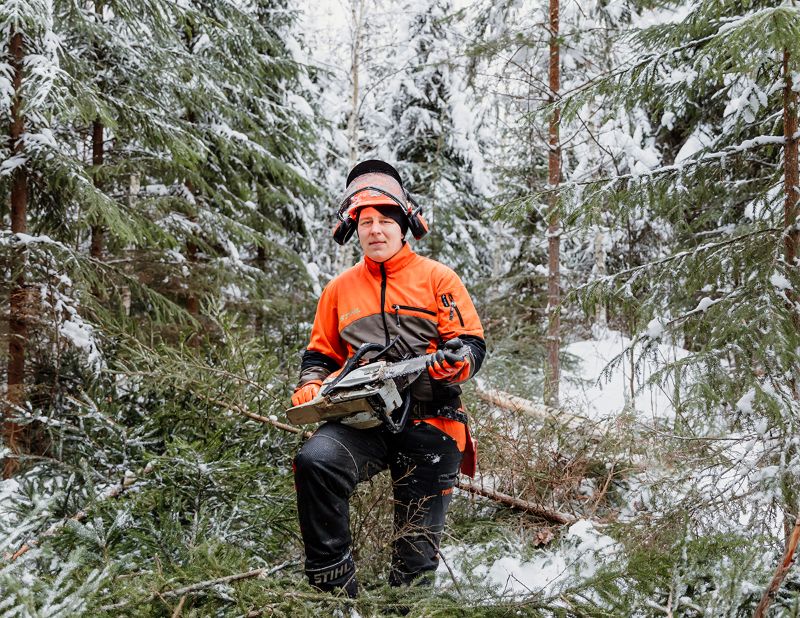Logger
"The role of forestry in Finland is important now and in the future. There will be plenty of work for loggers, and especially a lot of sapling group clearing in the future. Legislation related to nature conservation may change. Pest insects will become more common and more mixed forests will be grown in the future. However, the logger profession will remain fairly similar."

- Juho Onali
- A logger at Hartola-Forest Ay.
- Has graduated as a forestry engineer from Nikkarilan metsäopisto.
- 15 years of work experience in the field.
Briefly explain what you do for a living.
I work as a logger, and my tasks include planting saplings, clearing forests and groups of saplings, prior clearing before felling, as well as restoring young forests. In addition, I carry out logging with a chainsaw and fell yard trees.
How have you ended up in the profession of your choice?
I have done forestry work with my father, since I was a little boy. I made firewood, cleared the forest with a bill hook and planted saplings with a planting tube. Therefore, becoming a logger was a natural choice for me.
Describe your typical working day or week.
The weather and season affect what my working day is like. In the spring, the task may be, for example, the planting of spruce saplings, ordered by the landowner, in an area that has recently been felled. In the autumn, more time is spent on clearing work. I usually work on the same site several days in a row. I take the tools and equipment to the site and start the job.
What kind of work environment or working hours do you have?
I work in the woods. I arrive at the site at daybreak, and work until it gets dark. A logger always works outside, whatever the weather.
What kind of competence or qualities are required in the profession?
A logger must have a tough nature, in order to carry out forestry work in all kinds of conditions. One must be in good physical condition, as the work is quite heavy and loggers must sometimes walk in very rugged or rocky terrain in the forest. Efforts should be made to work ergonomically to save one’s energy. A logger must be able to perceive distances, as felling trees must also be planned from the perspective of where trees are felled and collected, and from where they are picked up. In addition, respecting nature is an important part of the work.
What is the best thing about your profession?
I am an introvert, and in this job I can be in the forest on my own, without distractions. There is also no one constantly criticising my work. I feel that the forest is a place where I gain strength.
What are the downsides of the profession or what seems challenging?
The downsides of the profession are the various and challenging weather conditions and natural elements. The most difficult time is in winter, when there is a lot of snow, sleet and the temperature is close to zero.
What would you tell a person considering the profession of a logger?
It is advisable to invest in the gear. You must have quality tools, good shoes, a helmet and plenty of decent winter gloves. Forestry work requires mental strength; you can cope by yourself in the midst of nature if you have sufficient determination.
How do you see the future of your profession?
The role of forestry in Finland is important now and in the future. There will be plenty of work for loggers, and especially a lot of sapling group clearing in the future. Legislation related to nature conservation may change. Pest insects will become more common and more mixed forests will be grown in the future. However, the logger profession will remain fairly similar.
Photo: Sami Mäkinen
